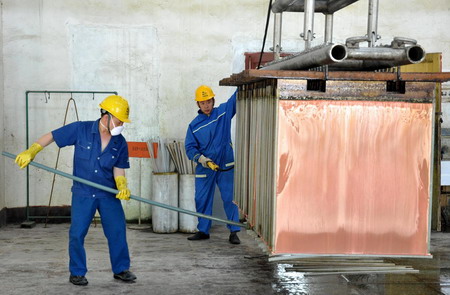Economy
Recycled metals sector set to be restructured
By Zhang Qi (China Daily)
Updated: 2011-02-12 10:57
 |
Large Medium Small |
MIIT plans to reform the industry to improve efficiency and output

BEIJING - China aims to greatly increase the proportion of recycled nonferrous metals used in its industries.
To achieve this it plans to optimize the organization of the industry and accelerate the restructuring process, the Ministry of Industry and Information Technology (MIIT) said on its website.
The MIIT announced a plan on Thursday, in collaboration with the Ministry of Science and Technology and the Ministry of Finance, to nearly double the capacity of recycled metals production by 2015.
The country expects to produce about 12 million tons of recycled base metals in 2015, compared with 6.33 million tons in 2009.
China produced 720,000 tons of recycled nonferrous metals in 2000, with the average annual growth rate reaching 27 percent in the decade since then.
He Zaihua, a senior researcher with CIConsulting, said the nonferrous metals industry relies heavily on the product, a fact that has led to a rising proportion of recycled metals in the sector.
China is currently at a developmental stage in its use of recycled metals. Industry concentration is low and lacks effective regulation and management. There are more than 300 producers of recycled lead, which had an average capacity of 4,100 tons in 2009, the statement said.
Meanwhile, the recycled aluminum industry is also diverse, with small players producing a just few hundred tons annually.
"This is why the plan highlights the government's decision to establish (by consolidation) a couple of major producers with an annual capacity of 100,000 tons," Han said.
In its statement, the ministry said it wants the top 10 companies in the industry to account for half of the total output by 2015.
Recycled copper will account for about 40 percent of total copper output. Recycled aluminum will provide 30 percent and recycled lead 40 percent of total output, the statement said.
Recycled base metals accounted for an average of 24 percent of total output in 2009.
The government is also encouraging the industry to concentrate geographically in a few regions, with regional capacity touching more than 80 percent of the total.
Meanwhile, the government will provide financial support for leading producers to merge with smaller players during the next five years.
According to a report from CIConsulting, the development of recycled base metals is strategically important. In 2009, China consumed 40 percent of the world's copper and imported 60 percent of its domestic copper consumption.
Chinese copper smelters have been under pressure as a result of limited resources, highlighting the urgent need for efficient use of recycled copper.
| 分享按鈕 |



